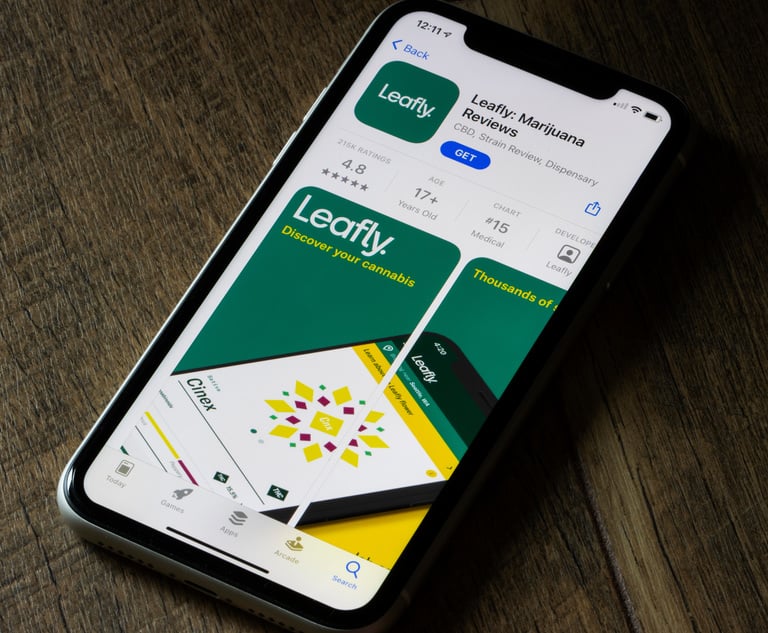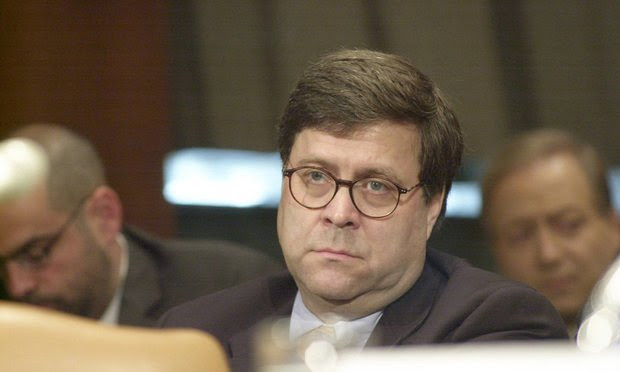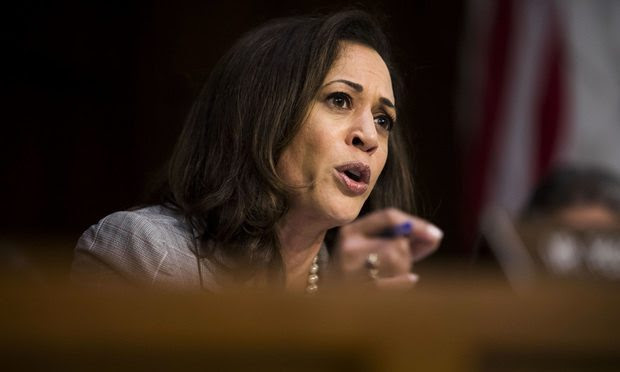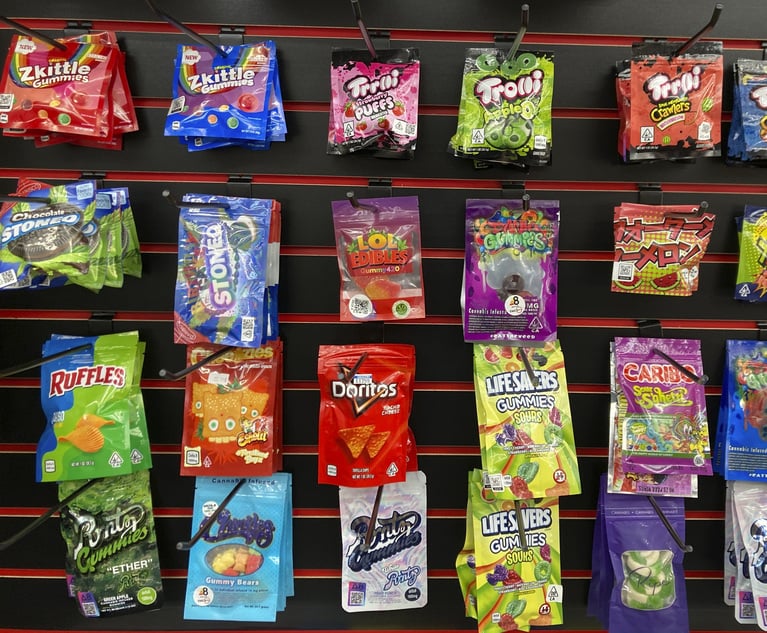Higher Law: On Marijuana, Is Barr Better? | Big Law's M&A Work | Pot & Pilot Licenses: Yes, There's a Case
Two Am Law 100 firms were involved in a mega-deal in the cannabis space. We've got the latest on California regulations, and scroll down for some early thinking on William Barr, the U.S. attorney general nominee. This is Higher Law—thanks for reading!
December 13, 2018 at 04:00 PM
10 minute read
Welcome back to Higher Law, our weekly briefing on all things cannabis. I'm Cheryl Miller, reporting for Law.com from Sacramento.
Armed with tea and Vitamin D—sorry, no CBD-infused products for now—I'm back in action this week with an avalanche of news from the cannabis world. There's a new attorney general on the horizon, and cannabis attorneys seem wary but hopeful. California is one step closer to adopting cannabis regs, but questions and criticisms remain. Plus, we have the story of a crash-landing pilot, a few THC-infused candy bars and the D.C. Circuit. And two big law firms were on a mega-deal in the cannabis space.
Thanks as always for reading and for your story tips. Any expectations for the new year? Anything we should be looking to cover? Please keep your thoughts and ideas coming. Drop me a note at [email protected] or you can call me at 916-448-2935. Follow me on Twitter at @capitalaccounts. Find more info about Higher Law here.
What's the Thinking on William Barr & Cannabis?
Goodbye, Jeff Sessions. Hello, (maybe), William Barr. President Trump has nominated Barr, a former U.S. attorney general under President George H.W. Bush, to lead the U.S. Department of Justice.
>> What does that mean for cannabis-legal states? While there's some concern about Barr's hard-line, crackdown-on-drugs statements from the 1990s, the general consensus seems to be that the Kirkland & Ellis of counsel is no Jeff “Good People Don't Smoke Marijuana” Sessions.
“The overriding sentiment from our membership is that [Barr] does not bring the type of historical animus or agenda that we saw from his predecessor … and that there is much to learn about William Barr's views on our industry during his confirmation hearings,” the National Cannabis Bar Association said in an alert.
Greenspoon Marder partner Rachel Gillette told Marijuana Business Daily she's taking a “wait and see” approach to the nominee. “Let's hope that he's somebody who has a willingness to learn and grow and change given what's happened with the public sentiment to cannabis over the last 10 years.”
Barry Grissom, the former U.S. attorney for the state of Kansas who's now corporate counsel for cannabis advisory firm Electrum Partners, told Leafly not to read too much into Barr's pro-drug-war past.
“I see him as someone who's an institutionalist,” Grissom said. “I don't think he's going to relive 1991 to 1993.”
Big Law Gets the Cannabis M&A Work
Two big firms not usually associated with cannabis work helped close a mega-deal that highlights Big Tobacco's jump into the marijuana industry. Wachtell, Lipton, Rosen & Katz represented tobacco giant Altria in a $1.8 billion investment deal with Canadian marijuana producer Cronos Group. Sullivan & Cromwell advised Cronos.
Business Insider reports that Sullivan & Cromwell, which does not advise U.S. cannabis companies, got involved in the deal through Cronos CEO Michael Gorenstein, a Sullivan alum.
Altria's 45 percent investment stake in Cronos is another sign of tobacco and alcohol companies' increasingly keen interest in a global marijuana space that cannabis market research firm Brightfield Group says could generate $31 billion in sales by 2021.
“There's always been the expectation that big business was going to come in; we've been hearing rumors about 'Marlboro Greens' for decades now,” Bethany Gomez, Brightfield Group's director of research, told The New York Times. “Now we're past the point of no return.”
California Regulatory Update!
California sent its proposed cannabis regulations to the Office of Administrative Law on Dec. 7, one of the last procedural steps before the rules become final. I'm still sifting through the 1,000-plus pages of changes and comments released by the Bureau of Cannabis Control, but here are a few takeaways.
>> The rules are a win for cannabis delivery platforms. Over the complaints of local government agencies and law enforcement, regulators left in language allowing marijuana deliveries anywhere in the state, even in municipalities that bar dispensaries and grows. A new section also recognizes delivery platforms' authority to do business “with certain restrictions.” (Remember the dust-up between state regulators and Weedmaps earlier this year?)
Weedmaps spokesman Carl Fillichio declined to comment on the new platform rules but generally praised efforts to expand delivery availability.
“While there is plenty of work for lawmakers to do in 2019 in un-sticking local licensing to facilitate broader safe access, regulators certainly got it right in clarifying that licensed delivery should be permitted to patients and consumers regardless of where they live,” he said in an email.
>> Language relating to branding and IP continues to give attorneys heartburn. Key provisions prohibit licensees from doing business “on behalf of, at the request of or pursuant to a contract with” a non-licensee. The state Bureau of Cannabis Control said the language is meant to discourage people trying to indirectly run an operation without registering or paying for the needed permits.
The problem, Dorsey & Whitney partner Michael Weiner said, is “the far-reaching implications for any authorized cannabis operators and IP licensors engaging with these companies who have an existing license deal or are considering entering into an operating relationship.”
A licensing deal could have been an “easy” alternative for non-licensees looking to get their brand on the market without going through the arduous licensing process, Weiner said.
“But with the new restrictions, non-licensees may not have a direct licensing option to get their brand onto cannabis goods,” he said. “While authorized cannabis operators and non-licensees may be able to turn to more complex contractual structures in order to continue to do business together, parties will need to tread carefully.”
>> Omar Figueroa of the Law Offices of Omar Figueroa has suggested some possible workarounds to the restrictions.
You Said It: Kamala Harris Edition
“Decriminalizing marijuana at the federal level isn't just a smart thing to do —it's the right thing to do. We can't keep repeating the same mistakes of the past. Too many lives have been ruined by these regressive policies.”
– U.S. Senator Kamala Harris, the California Democrat and potential 2020 presidential candidate, offers some drug policy thoughts on Twitter.
A Pilot's Pot Fight in the D.C. Circuit
My colleague C. Ryan Barber has this great story about a Utah pilot who survived a crash-landing in Kansas only to have his license to fly stripped after authorities found three cannabis-containing chocolate bars in his onboard briefcase.
Jeff Siegel, who was flying a Lancair Evolution plane like the one seen above, was not accused of flying under the influence or trafficking drugs. His wife said she put the candy, purchased legally in Colorado, in his briefcase without his knowledge. Federal lawyers say the Federal Aviation Administration and the National Transportation Safety Board have broad authority to revoke pilot licenses when they find drugs, even state-legal marijuana.
“The government's lawyers have noted that, while the chocolate bars might have been purchased in Colorado, federal law continues to prohibit possession of cannabis regardless of where it is bought or consumed,” Ryan writes.
Siegel is challenging the FAA's penalty in the U.S. Court of Appeals for the D.C. District.
>> Ryan emails me about the DC Circuit hearing: “The judges did not raise the clash between the federal government and states that have legalized cannabis use. Indeed, the judges did not appear inclined to overturn the NTSB's decision to revoke the pilot certificate.”
You can listen to the full audio here.
In the Weeds…
>> Congress has green-lighted hemp. A provision in the annual farm bill passed by lawmakers this week frees hemp from the Controlled Substances Act. Fans of the non-psychoactive cannabis varietal can thank Senate Majority Leader Mitch McConnell, who was eager to help out his home-state farmers in Kentucky. If President Trump signs the bill, as anticipated, “we expect hemp-based product sales (with and without CBD) to grow faster than marijuana-based products in the U.S.,” Khurram Malik, CEO of Biome Grow, said in a prepared statement. [Vox]
>> The U.S. Tax Court backed Section 280E, again. The owners of Harborside, the iconic Oakland, Calif. dspensary, lost their years-long legal bid to persuade a court that state-legal marijuana operations should be able to deduct ordinary business expenses from their taxes. Harborside's founder wrote that they ” are prepared to pursue this case, legally and politically, for as many more years as it takes to achieve the justice that cannabis patients and practitioners deserve.” [Cannabis Business Times]
>> Florida's governor-elect may scale back the state's marijuana litigation. Lt. Gov.-elect Jeanette Nuñez said Ron DeSantis is “not interested in continuing that fight” against a ruling striking down a law that, among other things, capped the number of medical marijuana issues the state can issue. Outgoing Gov. Rick Scott's administration has fought several legal attempts to allow more expansive use of medical marijuana in Florida. DeSantis takes office on Jan. 8. [Daily Business Review]
>> Advocacy groups have sued to restore Utah's voter-approved medical marijuana initiative. A “compromise” bill passed by Utah's Legislature last month narrowed the initiative's reach, reducing the number of ailments for which medical marijuana can be obtained and preventing residents who live long distances from dispensaries from growing their own plants. State law allows lawmakers to modify voter-approved initiatives. [AP]
>> The line between pot advocacy and top politicians may have blurred a little in California. Jason Kinney, a key player in the successful 2016 campaign to legalize marijuana in the Golden State, is now working for Gov.-elect Gavin Newsom's transition team. He stopped lobbying in early November for California Strategies & Advocacy, which has a number of cannabis clients, and then appeared a week later on a MJBizCon panel in Las Vegas touting the state's legalization efforts — and a former colleague, who recently launched his own lobby shop with cannabis clients. Kinney said his appearance “was routine, appropriate and not in conflict with my work on the transition.” [CALmatters]
Events Calendar: What's Next
Dec. 13-14 - The Monterey Cannabis Summit takes place on California's Central Coast. Scheduled speakers include retired Rep. Sam Farr, co-author of the first federal budget amendment to bar the U.S. Department of Justice from spending money to prosecute state-legal medical marijuana operations.
Dec. 15-16 - The Emerald Cup takes place in Santa Rosa, Calif. Lori Ajax, head of the California Bureau of Cannabis Control, and IP attorney Matthew Lapple of Lapple Ubell are among the listed speakers.
Jan. 5-6 - The Maui Cannabis Conference will be held in Lahaina. Panelists are scheduled to discuss cryptocurrency, marketing and branding and the future of cannabis in Hawaii.
Higher Law is going on hiatus for the holidays. We'll be back in 2019 with a look at what's next for regulated cannabis. See you then!
This content has been archived. It is available through our partners, LexisNexis® and Bloomberg Law.
To view this content, please continue to their sites.
Not a Lexis Subscriber?
Subscribe Now
Not a Bloomberg Law Subscriber?
Subscribe Now
NOT FOR REPRINT
© 2025 ALM Global, LLC, All Rights Reserved. Request academic re-use from www.copyright.com. All other uses, submit a request to [email protected]. For more information visit Asset & Logo Licensing.
You Might Like
View All
NY Cannabis Marketing Rulings / Rescheduling Effects / Honigman's Work on Trademark Suit / Goodbye
9 minute read
Workplace Weed and Labor Pacts / State AGs and Hemp / Maryland Licensing Suit / Vicente Sues Recruiter
9 minute readTrending Stories
- 1Decision of the Day: Judge Dismisses Defamation Suit by New York Philharmonic Oboist Accused of Sexual Misconduct
- 2California Court Denies Apple's Motion to Strike Allegations in Gender Bias Class Action
- 3US DOJ Threatens to Prosecute Local Officials Who Don't Aid Immigration Enforcement
- 4Kirkland Is Entering a New Market. Will Its Rates Get a Warm Welcome?
- 5African Law Firm Investigated Over ‘AI-Generated’ Case References
Who Got The Work
J. Brugh Lower of Gibbons has entered an appearance for industrial equipment supplier Devco Corporation in a pending trademark infringement lawsuit. The suit, accusing the defendant of selling knock-off Graco products, was filed Dec. 18 in New Jersey District Court by Rivkin Radler on behalf of Graco Inc. and Graco Minnesota. The case, assigned to U.S. District Judge Zahid N. Quraishi, is 3:24-cv-11294, Graco Inc. et al v. Devco Corporation.
Who Got The Work
Rebecca Maller-Stein and Kent A. Yalowitz of Arnold & Porter Kaye Scholer have entered their appearances for Hanaco Venture Capital and its executives, Lior Prosor and David Frankel, in a pending securities lawsuit. The action, filed on Dec. 24 in New York Southern District Court by Zell, Aron & Co. on behalf of Goldeneye Advisors, accuses the defendants of negligently and fraudulently managing the plaintiff's $1 million investment. The case, assigned to U.S. District Judge Vernon S. Broderick, is 1:24-cv-09918, Goldeneye Advisors, LLC v. Hanaco Venture Capital, Ltd. et al.
Who Got The Work
Attorneys from A&O Shearman has stepped in as defense counsel for Toronto-Dominion Bank and other defendants in a pending securities class action. The suit, filed Dec. 11 in New York Southern District Court by Bleichmar Fonti & Auld, accuses the defendants of concealing the bank's 'pervasive' deficiencies in regards to its compliance with the Bank Secrecy Act and the quality of its anti-money laundering controls. The case, assigned to U.S. District Judge Arun Subramanian, is 1:24-cv-09445, Gonzalez v. The Toronto-Dominion Bank et al.
Who Got The Work
Crown Castle International, a Pennsylvania company providing shared communications infrastructure, has turned to Luke D. Wolf of Gordon Rees Scully Mansukhani to fend off a pending breach-of-contract lawsuit. The court action, filed Nov. 25 in Michigan Eastern District Court by Hooper Hathaway PC on behalf of The Town Residences LLC, accuses Crown Castle of failing to transfer approximately $30,000 in utility payments from T-Mobile in breach of a roof-top lease and assignment agreement. The case, assigned to U.S. District Judge Susan K. Declercq, is 2:24-cv-13131, The Town Residences LLC v. T-Mobile US, Inc. et al.
Who Got The Work
Wilfred P. Coronato and Daniel M. Schwartz of McCarter & English have stepped in as defense counsel to Electrolux Home Products Inc. in a pending product liability lawsuit. The court action, filed Nov. 26 in New York Eastern District Court by Poulos Lopiccolo PC and Nagel Rice LLP on behalf of David Stern, alleges that the defendant's refrigerators’ drawers and shelving repeatedly break and fall apart within months after purchase. The case, assigned to U.S. District Judge Joan M. Azrack, is 2:24-cv-08204, Stern v. Electrolux Home Products, Inc.
Featured Firms
Law Offices of Gary Martin Hays & Associates, P.C.
(470) 294-1674
Law Offices of Mark E. Salomone
(857) 444-6468
Smith & Hassler
(713) 739-1250
















